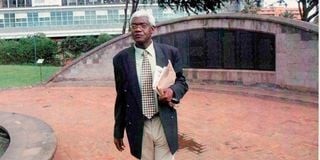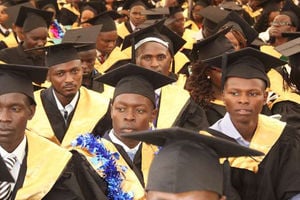
Prof Daniel Sifuna Namusonge.
The history of graduate teacher education in Kenya dates back to 1972, when the University of Nairobi established the Faculty of Education. This was two years after the establishment of the University of Nairobi as fully chartered university through an Act of Parliament. Before that, Nairobi was part of the University of East Africa that comprised Makerere and the University of Dar es Salaam.
Records show that the establishment of the Faculty of Education was part of Kenya’s strategy to produce high calibre professionals to teach in secondary schools and help the country raise its education standards and prepare the next generation of the workforce.
The Act that created the University of Nairobi in 1970 also established Kenyatta University College as a constituent college of Nairobi with the mandate of training graduate teachers. Then, Kenyatta College, formerly a British Army barrack, offered secondary and teacher training education leading to the award of Secondary Teacher 1 (S1) and Secondary Teacher Advanced Level (SA) certificates. Kenyatta University College admitted its first cohort of graduate teacher trainees in 1972, but a major turning point came in 1978, when the Faculty of Education was transferred from the University of Nairobi to the College.
Prof Daniel Namusonge Sifuna, who passed on this past week, was one of the pioneers of the Faculty of Education at Nairobi and later Kenyatta University. He attained his bachelor's degree in education from Makerere University in 1971 and later joined the University of Nairobi for master’s and doctorate programmes in education.
For all his adult life, Prof Sifuna’s life revolved around education. A whole generation of high school teachers and education scholars in Kenya and East Africa passed through his hands. His specialties were history of education, sociology of education and comparative education.
Educational philosophies
Prof Sifuna was no ordinary lecturer and scholar. He regaled his students with depth of insights and knowledge on educational philosophies and practices. He infused knowledge with practical experiences, some bordering on absurdity. And he was highly opinionated, satirical and cynical, expressing himself forcefully with facts and figures and lambasting at those articulating pedestrian ideas. He had no time for dumbbells and routinely remarked that little knowledge is dangerous.
As a researcher and practitioner, Prof Sifuna critiqued educational policies, establishing the nexus between education failures and politics and economy and, in turn, calling for researched-led interventions. Several times, he criticised education policies, faulting them for lack of thought and being politically-driven.
For example, he always questioned how the Presidential Working Party on the Second University in Kenya of 1981, chaired by Dr Collins Mackay, ended up recommending the change of the country’s education system to 8-4-4 when its mandate was to advise on creation of the second university. To be sure, the Working Party had eight terms of reference; none was on reforming the education system or structure. So, it was surprising that, in its report, it made a major recommendation to change the education system from the then 7-4-2-3 to 8-4-4. For good measure, it recommended the establishment of Moi University as the country’s second university, which came to be in 1984.
According to Prof Sifuna, part of the reason for the challenges that bedevilled 8-4-4 was politics; it was never anchored on empirical evidence and, therefore, the implementation was never thought through. Now, the country is phasing out 8-4-4 to replace it with the competency-based curriculum, which Prof Sifuna also argued lacks proper philosophical foundation as it oscillates between the 7-6-2-4 and 8-4-4 systems. Similarly, Prof Sifuna argued cogently against the exponential expansion of universities, stating it had diluted quality of higher education and contributed to the high levels of graduate unemployment. To date, the public university system is tottering on the brink of collapse due to poor funding, declining quality of teaching and learning and dearth of research and publications.
For his radical thinking, Prof Sifuna faced personal and professional challenges. At one point in the late 1980s, he was appointed chairman of the then Kenya Institute of Education (KIE), presently Kenya Institute of Curriculum Development (KICD).
However, this was short-lived. After the inauguration, the council never met again. Apparently, he had been appointed on account of his credentials but when the powers-that-be realised it was the radical Prof Sifuna, the appointment was rescinded.
At Kenyatta University, Prof Sifuna never progressed to top leadership because that required political connection, especially during the Kanu regime when professors were reduced to paying homage to political brokers for academic promotions. It is not lost that there was a time when Kanu mandarins planted spies in lecture theatres to monitor and report what lecturers said in class. Sometimes in the early 1990s, some academics even organised and styled themselves as Kanu professors, using their intellect to propagate the party’s propaganda.
Professional breakthrough
Indeed, one of his low moments was in 2003 when he won a fellowship to teach on sabbatical at a university in Japan, itself a major professional breakthrough, but the then vice-chancellor refused to release him out of sheer malice. He went nevertheless and was promptly sacked. But as fate would have it, the vice-chancellor was also sacked soon thereafter, and Prof Sifuna got back his job upon his return to Kenya.
Prof Sifuna’s tenure at the university and largely at Kenyatta University where he worked since the mid-1970s, was marked by ups and downs.
He lived and worked through the halcyon days of university of education of the 1970s when the institutions prided themselves as citadels of intellectual discourse to the present when the institutions became paper-pushing conveyor-belt entities.
The history of teacher education in Kenya and East Africa cannot be written without a chapter on Prof Sifuna’s contribution. He taught, published, researched and consulted widely on education. He influenced the course of education training and by extension, teaching in Kenya’s high schools and higher education institutions. He goes down as one of the towering educationists of his time. His legacy lives for generations.
David Aduda is a Consulting Editor and Education Specialist. [email protected]







